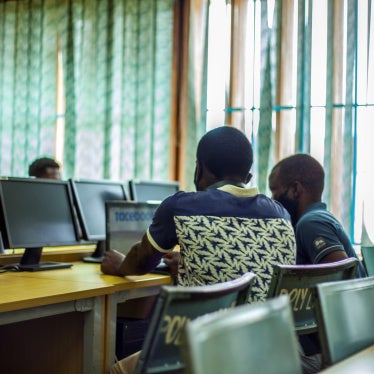Letter to H.E. the Minister of Education and Vocational Training
Cc: National Examinations Council of Tanzania
Cc: Tanzania Institute for Education
Cc: Permanent Secretary, Ministry of Education and Vocational Training
26 March 2014
Re: Access to Secondary Education in Tanzania
Dear Honorable Minister,
Please accept our regards on behalf of Human Rights Watch and the Tanzanian Child Rights Forum. Human Rights Watch is an international nongovernmental human rights organization conducting research and advocacy in over 90 countries, including on child labor and the right to education. The Tanzanian Child Rights Forum is a platform of nongovernmental organizations committed to the fulfillment of children’s rights in Tanzania.
We are writing to appeal to you to ensure that access to secondary school will no longer be denied on the basis of the primary school leaving exam (PSLE). At present, the PSLE is used as a selection mechanism and limits number of students in secondary school. As you know, in 2013, 50.6 percent of pupils passed the PSLE, denying about half of those who took the test—more than 400,000 pupils—access to secondary education. In 2012, only around 30 percent of pupils passed. Girls risk being disproportionately affected, due to lower PSLE performance rates compared to boys, according to statistics provided in the 2012-2013 Education Sector Performance Report.
Research conducted by Human Rights Watch on child labor in Tanzania’s small-scale gold mines in 2012-13 involved interviews with 80 children, as well as with over 100 other interviewees, including parents, adult miners, teachers and principals, and government officials. Among our findings was that school fees for secondary education provide a burden for many impoverished families, causing some children to drop out of school and start working in mining. In addition, we found that some children start working in the mines after completing primary school and failing the PSLE. In this way, the use of the PSLE as selection mechanism contributes to child labor in small scale gold mining. Eliminating the selection function of the PSLE might help larger numbers of children stay in school.
We support the efforts made by the government of Tanzania to promote access to education for all children, and have taken note of the significant progress made in primary education, and to some extent in secondary education. We understand that the new education and training policy is currently being considered by cabinet. We welcome the policy’s proposal for compulsory secondary education up to form 4. We appeal to you to take steps to ensure the speedy adoption of the policy, and to undertake the necessary measures to prepare the education sector for the envisaged changes. In particular, schools need to be equipped to enroll and teach significantly larger numbers of students.
We recognize the use of the PSLE to assess performance is a legitimate and a crucial tool in education. However, the PSLE should be changed from a selection tool into an assessment tool. The selection function of the PSLE, which bars children from obtaining a secondary education, should be abolished.
Under Tanzanian law and international conventions that Tanzania has ratified, every child—that is, anyone under the age of 18—has a right to education. The Convention on the Rights of the Child, in article 28, encourages that different forms of secondary education be made available and accessible to every child, such as through the introduction of free education and financial assistance for those in need. The International Covenant on Economic, Social and Cultural Rights (ICESCR), in article 13, provides that secondary education “shall be made generally available and accessible to all by every appropriate means, and in particular by the progressive introduction of free education.”
The United Nations Committee on Economic, Social and Cultural Rights, the international expert body that monitors state compliance with the ICESCR, in its General Comment No. 13 on the Right to Education (1999), states that the phrase “generally available” signifies that secondary education not be dependent on a student's apparent capacity or ability, and that secondary education will be distributed throughout the state in such a way that it is available on the same basis to all.
The Committee also explains that the “progressive introduction of free education” means that while states must prioritize the provision of free primary education, they also have an obligation to take concrete steps towards achieving free secondary and higher education.
Human Rights Watch and the Tanzania Child Rights Forum consider the use of the PSLE as a selection mechanism to secondary education to be contrary to the right to education as provided under international law.
We appeal to you to take all possible measures to ensure that children can access secondary education, irrespective of their PSLE results.
Thank you for your consideration.
Sincerely,
Zama Coursen-Neff Eric Guga
Executive Director Coordinator
Children’s Rights Division Tanzania Child Rights Forum
Human Rights Watch








